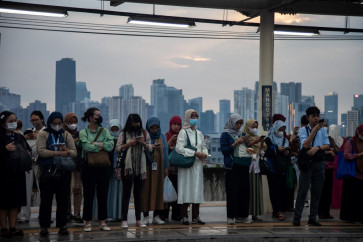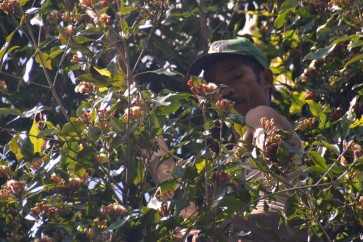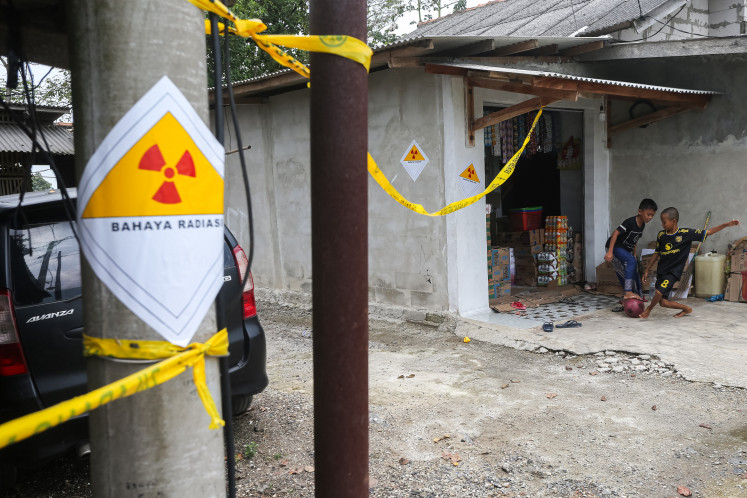Popular Reads
Top Results
Can't find what you're looking for?
View all search resultsPopular Reads
Top Results
Can't find what you're looking for?
View all search resultsHelping the deaf with theater
Theatrical scene: Solidarity France Indonesia aims at fighting against discrimination of deaf people through acting and theater workshops for the hearing impaired
Change text size
Gift Premium Articles
to Anyone
T
span class="caption" style="width: 290px;">Theatrical scene: Solidarity France Indonesia aims at fighting against discrimination of deaf people through acting and theater workshops for the hearing impaired. JP/Kunang Helmi
Virginie Lasilier is an elegant, but also determined young French actress on a mission. She wants to help Indonesia’s hearing impaired.
And that afternoon in April 2009, she was beaming in Paris’ Cafe Etienne Marcel. Virginie Lasilier had just won the Chattawak Nom’Art Spirit award for the best social work accomplished by a young woman, while working with Solindo — also called Solidarite France Indonesia, an association dedicated to Indonesia’s deaf.
It was the first time the dynamic CEO of Chattawak fashion, Stephane Chomarat, gave this 10,000-euro award.
“We decided to give Lasilier the award because she represents the values that constitute our identity, being open to the world and others,” said the founder of Chattawak.
Chomarat added that Lasilier’s association helped deaf people overcome many of the difficulties associated with the inability to hear, and hoped that following awards would go to causes as worthy as Solindo’s.
The prize money will help Lasilier organize a grand tour of the major cities of Java to help the hearing impaired become independent and capable of helping themselves.
Solidarity France Indonesia aims at fostering relationships between those can hear and the deaf, through cultural work, to fight against discrimination of deaf people.
Lasilier empowers the hearing impaired by teaching them how to be actors, or enabling them to perform jobs in the theater world.
Her association also raises awareness about the problems associated with being deaf in a society where social networks to help those with this handicap are not really in place yet, due to financial and other reasons.
The theatrical performances organized by Solindo are free of charge and draw from Indonesian theater traditions as well as French ones.
Improvisation, gamelan, flute music and percussion are part and parcel of this experience.
In 2010, Lasilier’s plans to work on an artistic and solidarity project, which brings together deaf adolescents and young adults living in Yogyakarta with French and Indonesian actors and artists.
She is also planning to put together a theatre and musical project that will take place in the principal cities of Java together with the French Cultural Centres scattered around Indonesia.
Her association also focuses on sensibilizing the public towards handicaps and differences.
This theater project was born in 2001 when Lasilier met Galuh Sukmara, the president of the association Matahariku. Solindo and Matahariku collaborated in various mini-projects in 2003, 2004 and 2005.
The first major performance took place in 2006 at the LIP-French Cultural Centre where it garnered a resounding success. Therefore Lasilier and Sukmara decided to renew this project over six months between February and July 2011.
There will be public performances, workshops for the deaf to teach them how to express themselves through mime, theater, dance and acrobatic performances. Participants such as the artists, training personnel and deaf actors will be paid.
Anouk Azar will be in charge of the video documentation of this project, as she has done in the past since 2004.
The French association Solindo was founded in December 2000 by psychologist Gaelle d’Herouville, who wished to help the Matahariku association with its work in Indonesia.
The association is also active in France where a school in a little town in the Oise department has been paired up with an Indonesian school for the deaf.
The primary benefactors of this project are young adults and children living around Yogyakarta who are deaf, where approximately 200 hearing impaired between 12 and 35 years are taken care of.
About 50 regularly take part in Matahariku activities.
Lasilier hopes that Indonesians will also be inspired to take part more actively in the project and that some monetary support will be forthcoming to aid this often forgotten segment of society.
Lasilier is thrilled that the first building stone for this pro-ject came from the Chattawak prize and is confident the project will be a success.










